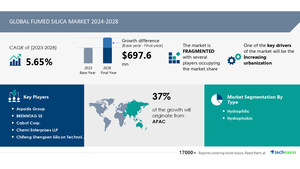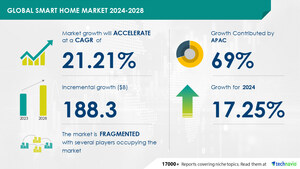NEW YORK, Dec. 4, 2024 /PRNewswire/ -- Report on how AI is redefining market landscape - The global meat market size is estimated to grow by USD 537.1 billion from 2024-2028, according to Technavio. The market is estimated to grow at a CAGR of almost 6.78% during the forecast period. Advancement in technology is driving market growth, with a trend towards rising demand for grass-fed and organic meat. However, increasing livestock disease outbreaks poses a challenge. Key market players include BRF SA, Cargill Inc., Clemens Food Group, Conagra Brands Inc., Danish Crown AS, Fieldale Farms Corp., Hormel Foods Corp., House of Raeford Farms Inc., Itoham Foods Inc., JBS SA, Johnsonville LLC, KOCH FOODS INC., Marfrig Global Foods SA, NH Foods Ltd., Perdue Farms Inc., Sysco Corp., Tyson Foods Inc., Vion Food Group, Wayne Farms LLC, and WH Group Ltd..
Key insights into market evolution with AI-powered analysis. Explore trends, segmentation, and growth drivers- View Free Sample PDF
Meat Market Scope |
|
Report Coverage |
Details |
Base year |
2023 |
Historic period |
2017 - 2021 |
Forecast period |
2024-2028 |
Growth momentum & CAGR |
Accelerate at a CAGR of 6.78% |
Market growth 2024-2028 |
USD 537.1 billion |
Market structure |
Fragmented |
YoY growth 2022-2023 (%) |
6.23 |
Regional analysis |
Europe, APAC, North America, South America, and Middle East and Africa |
Performing market contribution |
APAC at 42% |
Key countries |
China, US, Germany, France, and Japan |
Key companies profiled |
BRF SA, Cargill Inc., Clemens Food Group, Conagra Brands Inc., Danish Crown AS, Fieldale Farms Corp., Hormel Foods Corp., House of Raeford Farms Inc., Itoham Foods Inc., JBS SA, Johnsonville LLC, KOCH FOODS INC., Marfrig Global Foods SA, NH Foods Ltd., Perdue Farms Inc., Sysco Corp., Tyson Foods Inc., Vion Food Group, Wayne Farms LLC, and WH Group Ltd. |
Meat Market Trends: Protein-rich Diets and Ethical Meat Production The meat market is witnessing significant trends, with a focus on protein-rich diets and ethical meat production. Consumers are seeking essential nutrients from chickens, rabbits, cows, pigs, sheep, goats, lamb, deer, duck, and more. Leaner cuts of beef, pork, mutton, and lamb are popular choices for those aiming for healthy bones and a healthy weight. Ethical production methods, such as grass-fed and organic, are gaining traction, with a growing concern for animal welfare and reducing the carbon footprint. Restaurant chains and home delivery models offer convenient options for consumers, from grilled steaks and roasted chickens to smoked ribs, curries, and celebrations. Meat processing includes smoking, salting, and fermenting, while genetics, animal husbandry, and feed formulation play essential roles in optimizing production. Celebrity endorsements and convenient packaging solutions cater to Western culinary tastes and fast-paced lifestyles. However, concerns over antibiotics and hormones, processed meats, and their potential health risks persist. Veganism and meat substitutes are gaining popularity as alternatives, with advancements in cultured meat, plant-based meat, and bioreactors. The market encompasses various retail channels, from hypermarkets and departmental stores to specialty stores and online platforms. Poultry, processed meats, and healthier diets continue to dominate the landscape, with a focus on product quality, packaging materials, automation, and convenience.
The global meat market is witnessing an increasing demand for grass-fed and organic meat. Consumers are opting for these options due to their perceived health benefits and sustainability. Grass-fed meat comes from animals that feed on grass and forage, resulting in leaner meat with higher levels of omega-3 fatty acids and antioxidants. This shift in consumer preference is driven by a desire for healthier food choices and growing concerns about the environmental impact of conventional meat production.
Request Sample of our comprehensive report now to stay ahead in the AI-driven market evolution!
• Meat Market: Overcoming Challenges in Protein-rich Diets and Ethical Meat Production The meat market faces numerous challenges in today's health-conscious and ethically-aware world. Protein-rich diets are popular, requiring a steady supply of essential nutrients from various sources like Chickens, Rabbits, Cows, Pigs, Sheep, Goats, Lamb, Deer, Duck, Beef, Pork, Mutton, and Leaner cuts of meat. Ethical meat production is crucial, with consumers demanding transparency in animal husbandry, feed formulation, and antibiotic and hormone usage. Meat processing includes smoking, salting, fermenting, and preserving methods like curing, drying, and roasting. Meat substitutes, veganism, and cultured meat are emerging trends. Product quality, packaging materials, and automation are essential for convenience and longer shelf-life. Animal welfare, meat processing, and food safety are significant concerns. Fast-paced lifestyles and culinary tastes drive the demand for processed meats, raw meat, and ready-to-eat meat. Urbanization and the rise of fast-food chains, cafes, hotels, and livestock farming impact the market. Meat production's carbon footprint is a growing challenge. Fresh meat, cooked meat, and various retail channels like hypermarkets, departmental stores, specialty stores, online stores, and poultry farms cater to diverse consumer needs. Meat market players must address these challenges by focusing on leaner cuts, healthier diets, and sustainable production methods. Collaborating with restaurants, deli food services, and retailers can help expand reach and ensure product quality.
• Disease outbreaks pose a significant challenge to the global meat market by negatively impacting animal health and disrupting livestock product trade. In the last five years, diseases such as foot-and-mouth disease, rinderpest, contagious bovine pleuropneumonia, rift valley fever, swine vesicular disease, sheep and goat pox, fowl plague, bovine spongiform encephalopathy (BSE), porcine circovirus 2 (PCV2) infections, porcine reproduction and respiratory syndrome (PRRS), swine flu, and avian influenza have caused global consequences. These diseases can be transmitted through animal-to-animal contact, person-to-animal contact, or from the environment, leading to the loss of livestock and inhibiting sustained investments in livestock production. Disease outbreaks can significantly impact the meat market by disrupting supply chains and increasing production costs. Proactive measures, such as disease prevention and control programs, are essential to mitigate the risks and ensure the sustainability of the meat industry.
Discover how AI is revolutionizing market trends- Get your access now!
This meat market report extensively covers market segmentation by
- Product
- 1.1 Poultry
- 1.2 Pork
- 1.3 Beef
- 1.4 Others
- Type
- 2.1 Processed
- 2.2 Fresh
- Geography
- 3.1 Europe
- 3.2 APAC
- 3.3 North America
- 3.4 South America
- 3.5 Middle East and Africa
1.1 Poultry- The global poultry meat market encompasses the production and sale of chicken, Turkey, and duck meat. This sector is projected to expand steadily throughout the forecast period. Key drivers include the cost-effective nature of poultry farming due to high feed conversion rates, the expanding restaurant industry, particularly in fast-food and fast-casual segments, and rising consumer disposable income. Major markets include China, Brazil, and India, due to their large populations. Poultry falls under the white meat category, which is healthier than red meat. Challenges include bird flu outbreaks in Asian markets, impacting production and consumption. Population growth, increasing incomes, and shifting dietary trends support continued growth in the poultry segment of the global meat industry.
Download a Sample of our comprehensive report today to discover how AI-driven innovations are reshaping competitive dynamics
Meat Market: A Comprehensive Overview The global meat market is a dynamic and diverse industry, encompassing a wide range of protein sources and production methods. From Chickens and Rabbits to Cows, Pigs, Sheep, Goats, Lamb, Duck, Beef, Poultry, Pork, and more, the market caters to various dietary preferences and ethical considerations. Protein-rich diets continue to gain popularity, fueling the demand for fresh meat and leaner options. Ethical meat production is a growing concern, with a focus on animal welfare and sustainable farming practices. Meat processing plays a crucial role in the industry, ensuring the safe and efficient production of fresh meat, processed meats, and ready-to-eat options. Innovations in the sector include cultured meat, plant-based meat, and fermented meats, offering alternatives to traditional animal-derived products. Bioreactors and clean meat production are emerging trends, offering potential solutions for more sustainable and ethical meat production. Pre-cooked and ready-to-eat meat options cater to the busy lifestyles of consumers, while processed meats continue to be a staple in many diets. Animal welfare remains a top priority, with stricter regulations and certifications ensuring ethical treatment of livestock. The market is expected to grow, driven by increasing global population and changing consumer preferences.
Meat Market: A Thriving Industry of Protein-Rich Foods and Ethical Production The meat market is a dynamic and diverse industry, offering a wide range of protein-rich foods derived from various animals such as Chickens, Rabbits, Cows, Pigs, Sheep, Goats, Lamb, Deer, Duck, and more. These essential nutrients, including protein, carbohydrates, fatty acids, vitamins, and minerals, are integral to maintaining healthy bones, muscles, and a healthy weight. Meat plays a significant role as a staple food in various cuisines and celebrations, symbolizing hospitality and generosity. From grilled steaks and roasted chickens to smoked ribs, curries, and convenience meats, meat is a versatile ingredient that caters to diverse culinary tastes and fast-paced lifestyles. The meat industry encompasses various aspects, including animal husbandry, feed formulation, genetics, and meat processing. With growing concerns about animal welfare and environmental impact, there is a shift towards ethical meat production, grassfed, organic, and leaner cuts. Meat production also involves various processing methods such as smoking, salting, and fermenting, while preservatives are used to enhance shelf-life and flavor. The market caters to various retail channels, including hypermarkets, departmental stores, specialty stores, online stores, and restaurant food service. However, the industry faces challenges such as the use of antibiotics and hormones, foodborne illnesses, and the rise of veganism and meat substitutes. The market continues to evolve, with innovations in cultured meat, plant-based meat, and automation, ensuring a sustainable and high-quality product for consumers.
1 Executive Summary
2 Market Landscape
3 Market Sizing
4 Historic Market Size
5 Five Forces Analysis
6 Market Segmentation
- Product
- Poultry
- Pork
- Beef
- Others
- Type
- Processed
- Fresh
- Geography
- Europe
- APAC
- North America
- South America
- Middle East And Africa
7 Customer Landscape
8 Geographic Landscape
9 Drivers, Challenges, and Trends
10 Company Landscape
11 Company Analysis
12 Appendix
Technavio is a leading global technology research and advisory company. Their research and analysis focuses on emerging market trends and provides actionable insights to help businesses identify market opportunities and develop effective strategies to optimize their market positions.
With over 500 specialized analysts, Technavio's report library consists of more than 17,000 reports and counting, covering 800 technologies, spanning across 50 countries. Their client base consists of enterprises of all sizes, including more than 100 Fortune 500 companies. This growing client base relies on Technavio's comprehensive coverage, extensive research, and actionable market insights to identify opportunities in existing and potential markets and assess their competitive positions within changing market scenarios.
Technavio Research
Jesse Maida
Media & Marketing Executive
US: +1 844 364 1100
UK: +44 203 893 3200
Email: [email protected]
Website: www.technavio.com/
SOURCE Technavio

WANT YOUR COMPANY'S NEWS FEATURED ON PRNEWSWIRE.COM?
Newsrooms &
Influencers
Digital Media
Outlets
Journalists
Opted In




Share this article